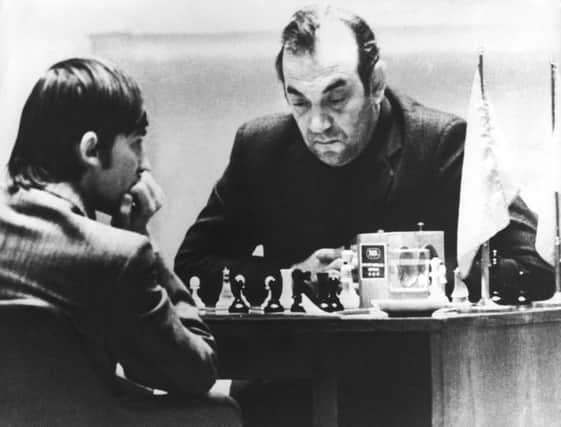Obituary: Viktor Korchnoi


Chess grandmaster, Viktor Korchnoi survived the horrors of the Second World War to become a four-time Soviet Champion, win five European Championships and reach number one in the world. Widely considered as one of the strongest players never to have become World Chess Champion, he turned his back on his homeland at the height of the Cold War and became the first grandmaster to defect to the West.
Thereafter, there ensued a number of grudge matches for the world title between Korchnoi and the USSR’s ‘golden boy’ Anatoly Karpov who was deemed to exemplify the Soviet Union’s supposed “intellectual superiority”. The result was a series of bizarre encounters both on and off the board with the world’s media hailing it as a struggle between “good and evil” and “Communist values versus Western decadence”. The encounters certainly captured the public’s imagination and brought chess into the public arena.
Advertisement
Hide AdAdvertisement
Hide AdUnfortunately, Korchnoi’s later career was overshadowed by Cold War politics, although in a career spanning almost 50 years, his uncompromising approach and contempt for easy draws produced numerous outstanding performances in international tournaments, winning him many admirers.
By 1990 Korchnoi had played in over 70 international chess tournaments and won or shared first place on 40 occasions and come outside the top three only seven times. He attributed his longevity to caviar, jogging and yoga. Well into his 70s, he was the oldest active grandmaster and only septuagenarian in history to remain in the world’s top hundred; he won the 2006 World Senior Chess Championship.
Born in Leningrad in 1931, during Stalin’s first five-year plan, Viktor Lvovich Korchnoi was the son of a Russian language and literature teacher father, who had to also work in a confectionary factory to survive, and a pianist mother. Their marriage ended soon after Viktor’s birth and his father remarried.
He started learning chess with his father aged six and attended classes, but then Second World War intervened; his father was conscripted and was killed at the Front fighting the Germans and his grandmother, who was raising Viktor, died of starvation at the siege of Leningrad. Although hospitalised, he survived and his fighting spirit and tenacity reared its head later in his playing style, which was characterised by aggressive counter-attacking and a tenacious defence, earning him the moniker “Viktor the Terrible”. He was then brought up by his step-mother.
From late 1943 onwards, Korchnoi enrolled in a chess club at the local Pioneer’s Palace (youth club) where he took part in tournaments and studied under the chess master Andrei Batuyev and, after the war ended, Vladimir Zak, who also talent-spotted Boris Spassky. In 1947, he won the USSR’s Junior Championship in Leningrad, and shared the title in 1948 in Tallinn, Estonia, the same year that he enrolled at Leningrad University to read History.In 1951, Korchnoi earned the Soviet Master title, after beating Smyslov, then ranked number two in the world. His first international tournament in 1954 was in Bucharest, and he won. He was awarded the International Master title in 1954 and the Grandmaster title in 1956 and won the Soviet Championship on four occasions between 1959 and 1970.
After becoming grandmaster, over the next 20 years Korchnoi travelled from tournament-to-tournament, and reached the Candidates Final, the match to determine the next challenger to the world title holder Bobby Fischer scheduled for 1975; he had beaten Spassky. His opponent was Russia’s newest star Karpov. Karpov won the contest, held in 1974, and became the World Champion by default when Fischer refused to defend his title.
As a chess player Korchnoi enjoyed much success but due to his outspokenness and several run-ins with his KGB minders, he found himself offered fewer and fewer opportunities to travel, frozen out in favour of the younger stars, Spassky and Karpov. Subsequently, during the 1976 Amsterdam tournament, which he won jointly with Britain’s Tony Miles, Korchnoi applied for political asylum in the Netherlands. Korchnoi’s next confrontation with Karpov came in 1978 and set the world alight. Played in Baguio City in the Philippines, the tournament was shrouded in controversy from the start. Karpov’s team included Dr Zukhar, a well-known hypnotist, and 17 KGB agents to ensure the “right” result, while Korchnoi employed two members of an Indian religious sect, then on bail for murder.
Korchnoi’s next world championship challenge against Karpov came in 1981 at Merano, Italy, having swept past leading grandmasters, Petrosian, Polugaevsky and Spassky. However, aged 30, Karpov was better prepared and at the peak of his powers. Again the match was played to a backdrop of political mischief with Korchnoi perhaps distracted by the Soviet authority’s refusal to let his wife, Bella and son Igor emigrate. He lost 6-2 with ten draws and a headline of “Massacre in Merano”.
Advertisement
Hide AdAdvertisement
Hide AdIn 1983, he faced a new Soviet star Kasparov in the semi-final, but with the USSR refusing to allow their man to compete in the US, Korchnoi won by default. Magnanimously, however, Korchnoi agreed to reschedule in London; despite a good start, Kasparov, who had similar troubles with the Soviet authorities who still favoured Karpov, triumphed; though the Soviet authorities lifted their boycott of Korchnoi because of his generosity.
Korchnoi wrote a number of books including, ‘Chess is My Life’ (1977). With the end of Communism, he was permitted to return to St. Petersburg where, in 2001, the St. Petersburg Chess Federation arranged a tournament for his 70th birthday.
Korchnoi’s first marriage was dissolved; he later married Petra Leeuwerik.
martin childs